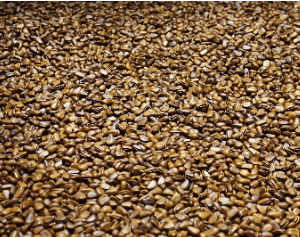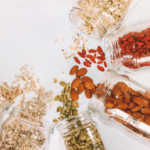Hemp, flax, and chia seeds are superfoods rich in nutritional value. These seeds are extremely beneficial and versatile in terms of their benefits and use in different recipes. They can easily be incorporated in various ways, blending with almost any type of food. They help your body to function in a healthy way through various vitamins and nutrients. They also help control and prevent some health conditions like diabetes or heart disease.

Hemp seeds
Hemp comes from the Cannabis sativa plant and is a different variety of cannabis (marijuana) but with minor traces of the psychoactive compound, Tetrahydrocannabinol (THC). Hemp seeds are small and yellowish. These are consumed in various ways like roasted or raw. Hemp seed oil is also popular in China as medicine and food. It is used for about 3000 years and is considered highly beneficial for health. Hemp milk and cheese are also prepared and popularly used.
Nutritional facts and Benefits:
- Unsaturated fats
The presence of polyunsaturated fats like Omega-3 which is rich in essential fatty acids in hemp seeds makes it very healthy and beneficial. Hemp seeds contain gamma-linolic acid which helps to reduce inflammation and reduces heart risk as well. Hemp seed oil or hemp seed consumption helps reduce blood pressure and reduces the risk of blood clotting. Since hemp seeds reduce inflammation, it helps in multiple diseases like arthritis, metabolic syndrome, fatty liver, and heart disease. It also improves skin conditions with anti-inflammatory properties.
- Fiber
Fiber intake in the diet promotes health in multiple ways. It manages weight, and blood sugar levels and promotes gut health. Hemp seeds are a good source of fiber and regular consumption can support you with health benefits.
- Rich in protein
Hemp seeds are a high source of protein. About 30 grams of hemp seeds contain 9.47 grams of protein. This is among the few high sources of plant-based protein food.
- Essential vitamins and minerals
There are various essential vitamins present in hemp seeds like iron, manganese, calcium, vitamin B & E, zinc, potassium, magnesium, and more.
Precautions
Hemp seeds can reduce blood clotting, so it is good to avoid them at the time of medical conditions using blood thinners. It is also advised to avoid it during pregnancy and breastfeeding as there is a lack of evidence that may show that it is safe during these conditions. Again, the fiber content in hemp seeds is high so it is advised to consume in moderate amounts to avoid bloating or nausea.
Flax seeds
Flaxseed is another superfood rich in vitamins and minerals. Flax seeds are one of the oldest crops found in two types, brown and yellow. It is better to consume grounded flaxseed than the whole. They can also be roasted and are also available as oil. It originated in the middle east and is known to be thousand years old, also known as linseed.

Nutritional facts and Benefits:
- Vitamins and minerals
Flaxseed is filled with nutrients, vitamins, and minerals like Fiber, Protein, Thiamine, Copper, carbohydrates, Magnesium, Fat, Zinc, and more. The high amount of copper helps in brain development and immunity present in flaxseed. It is also high in protein and fiber content.
- Soluble & Insoluble Fiber
The two types of fiber in flaxseed are good for gut health and bowel regularity. Insoluble fiber helps prevent constipation and soluble fiber manages blood sugar levels and cholesterol. About 30 grams of flaxseed consumption regularly can reduce 15% of bad cholesterol or low-density lipoprotein. It can effectively reduce BMI or Body mass index as well. One tablespoon of flaxseed contains 2 grams of fiber. Around 5-8% is advised for daily consumption by men and women.
- Rich in Lignans
Lignans are present in flaxseed which are plant compounds and studies show that they have cancer-fighting properties. Some studies also showed that it helped reduce breast cancer risks and prevent lung cancer, blood cancer, and colorectal cancer. Flaxseed can boast 70-800 times more lignans than other plant food.
- Omega 3 fatty acids
Alpha-linolenic acid (ALA) is a type of omega-3 fatty acid that is beneficial for heart health. This is one of the important fatty acids present in plant food like flaxseed and not produced by the human body. It is advised to consume this from different plant food sources rich in ALA. Alpha-linolenic acid helps in reducing heart problems and prevents stroke.
Precautions:
Since flax seeds are high in fiber, it is advised to consume them in moderate quantities to avoid digestive issues or bloating. Some people also face allergies due to flaxseed consumption. Medical assistance is advised in case of conditions like pregnancy or hormone therapy. Thyroid patients are advised to avoid flaxseeds for the presence of cyanogenic glycosides which is a plant compound. This forms thiocyanates by binding with the sulfur present in the human body. Excessive consumption of thiocyanates affects thyroid gland functioning. Flaxseed contains an antinutrient called phytic acid. Phytic acid prevents the absorption of minerals like zinc and iron. But if someone is not deficient in iron or any other essential vitamins, it is not a problem. Flax seeds are also advised to consume in moderate amounts for their laxative properties.
Chia seeds
Chia seeds are a superfood that is small but highly nutritious and consumed for a long time as a staple food. Salvia hispanica L. is the plant source of chia seeds popular initially in Mexico and Guatemala. These seeds absorb water quickly and go along well with juices or smoothies. They are easy to digest compared to flaxseed. There are two types of chia seeds, white and black.

Nutritional Benefits:
- Essential vitamins and minerals
Chia seeds contain all 9 essential amino acids, and they are good in protein content.
They are good in fiber, unsaturated fat, zinc, calcium, and copper as well. They are also a high source of omega-3 fatty acids. About 28 grams of chia seeds contain 140 calories.
- Fiber
These seeds are gluey in texture when soaked in water. They are good in soluble fiber which lowers LDL cholesterol. It also controls blood sugar levels and slows down the digestion process.
- Heart health
The presence of omega-3 fatty acids supports or improves cardiovascular health and controls cholesterol and blood pressure. It also reduces inflammation and helps with weight loss management.
Precautions
Since these seeds absorb water and increase in volume, it is advised to consume soaked. There are cases of choking or clogging when chia seeds are consumed dry with water. It is tastier and healthier for the gut and digestion when consumed fully soaked in water.
Conclusion
Various types of food available are a good source of nutrition, but these superfood seeds are easy to use and can be quickly added to a variety of recipes. They easily blend add texture or crunch to enhance a recipe or simply add the nutritional value present in them. Apart from nutrition, they are also capable of combatting or preventing certain diseases and maintaining better health. These power-packed seeds are available easily in the market or online nowadays. You can always find different ways to add it to your daily diet and enjoy a super meal.
15/07/2022






